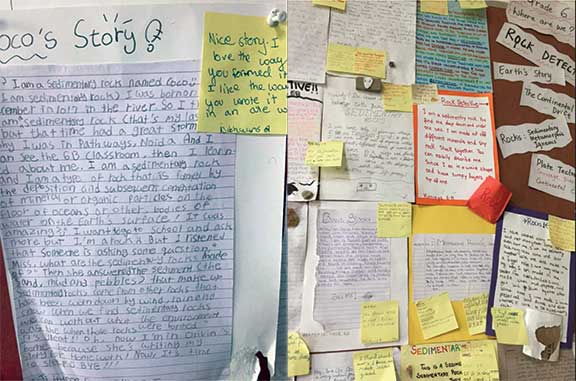Pallavi Sharma
Being an Individuals and Societies (I&S) educator is super exciting as no two days are similar. I am constantly on my toes when it comes to ideating about ways to empower learners. Most of the ideas that come to me come at the flick of a second. No matter how much I plan, I am an on-the-go educator. Although I have the basic framework of a lesson or unit planned, my tasks for the learners are usually unplanned and intuitive.
One such task that excited me was when my sixth graders were learning about the rock cycle and the types of rocks. The unit was on physical geography where we were inquiring into the ways physical geography informs us about the formation of the Earth. While investigating the types of rocks – sedimentary, igneous, and metamorphic – we went out in search of rocks and collected as many different kinds as we could. We brought them all to the classroom and invited our senior geography educator to tell us about the ways in which we could identify the types. The learners were super excited, but I didn’t want them to consolidate their learnings in the form of a report.
How else could my learners present what they understood from the lesson? Thus came the idea of – An autobiographical account of a rock! If the rock were to tell its story, what would it say? I roped in my colleague – an English educator – to take a class on writing an autobiographical account. And the results I got were astounding!

The autobiographical account was followed by a peer feedback session based on a simple rubric.
It didn’t stop there; the impact of the task was such that learners kept collecting rocks wherever they went and brought back interestingly shaped ones to class. They would often research about the rocks on their own. They even gifted teachers with rocks with taglines such as: “You are a Rock-star”, “Thank you for being the Rock of my life”.
It was indeed humbling to see an “off-the-head” idea take shape like this. I decided not to grade the work but the students assessed their own understanding of the lesson against a checklist.
By sharing this experience, I want to urge educators to take risks, small or big, and enjoy the process of learning and unlearning as educators. It’s worth trying!
The author is an International Baccalaureate (IB) Curriculum Coordinator, IBEN member, humanities facilitator and examiner with over a decade experience in education. She is also a teacher trainer, curriculum consultant, and education blogger seeking to create spaces of deep learning. She can be reached at p.shr.rajaratnam@gmail.com.
